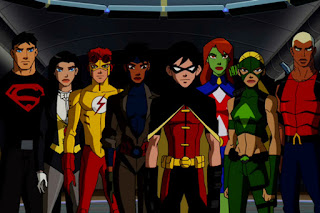
Kid Flash - Ego
The best place to start with this analysis is with the Team member who's been around the least: Kid Flash, aka Wally West. From a young age, Wally had been granted incredible power, but it's important to note that it wasn't given to him by circumstance. Unlike the others, Wally didn't gain his powers through a circumstance of birth or a random act of fate that thrust him into the superhero role. Wally gained his super speed through his own intelligence. Through his deductive powers, Wally discovered that his uncle was the Flash and managed to recreate the experiment that gave him his powers. Wally's journey to become Kid Flash was achieved entirely on his own. These events significantly shaped Wally's personality and mentality as a hero.
Becoming Kid Flash taught Wally that nothing can't be understood or controlled. While this event instilled a strong sense of confidence in Wally, it also gave him an overinflated ego. It's hard to blame him for it, to be honest. It's a natural outcome, considering his origin. From Wally's perspective, if you want superpowers, all you need to do is be smart enough to create them yourself.
This overinflated ego manifested in several ways that caused him to get in his own way. Wally had a bad habit of reacting negatively to things outside his understanding or control for the longest time. The earliest example of this would be Wally's disbelief in magic during the episode "Denial." When confronted with undeniable proof of magic and supernatural abilities, Wally repeatedly tried and failed to rationalize it with science. This inability to accept things outside his comprehension and control caused several conflicts during the Team's journey through the Tower of Fate and battle against Klarion. It's revealed throughout the episode that Wally refuses to believe in magic because doing so would be admitting that there are things in the world that are beyond his control or understanding. The ending of "Denial" is incredibly fitting since, to save the day, Wally has to relinquish control of his body to the unknowable magical entity, Doctor Fate.
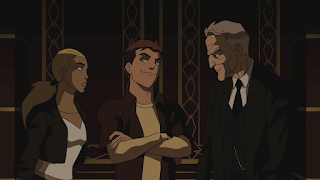
Run-ins with magic aren't the only time that Wally's ego and need to control caused problems for him. During the telepathic training exercise in the episode "Failsafe," Wally takes Artemis's "death" harder than the rest of the Team. When they discover Martian Manhunter and are given a glimmer of hope for their "dead" comrades, Wally is the first to rationalize things and tell the others that the alien death rays are actually teleporters. The fact that Wally is the one who proposes this hypothesis that keeps them in this false reality further shows Wally's willingness to use science to explain away things outside his control.
Another issue of his ego arises in Wally's most iconic episode, "Coldhearted." Wally is tasked with delivering a new heart to a girl needing a transplant while the rest of the Team takes out dangerous weather machines. While traveling with the heart, Wally struggles to take the mission seriously. He complains about not getting the "important" missions he deserves and wastes time battling Vandal Savage. Wally asserts on multiple occasions that he believes that he can do it all. Deliver the heart, take down Vandal Savage, and make it in time to help the Team destroy the weather machines. This lack of humbleness almost results in the death of Queen Perdita and the entire country of Vlatava falling into the hands of Count Vertigo. Luckily, Wally makes the right choices to save the day.
Wally West is the embodiment of the ego of a superhero. These heroes possess such incredible powers and abilities that they can quickly begin to believe that there is nothing they can't do. Everything is under their control, and anything that isn't can easily be explained away as a trick or lie. That thinking can be hazardous to the people the hero protects and themselves. Throughout the first two seasons, Wally learns to let go of his ego and accept the things out of his control.
Because Wally represents the hero's ego, he's the first and so far only member of the Team to die. At the end of season two, Wally sacrifices himself to save the entire planet from destruction. It's important to note that Wally's death was his choice. It is the ultimate example of killing one's ego. The death of Kid Flash also marks a turn in the series. Young Justice became much more serious, and the stakes became much higher. The death of the ego may be necessary for the growth of a hero, but what about the high standards that they hold themselves to? The unattainable ideal of perfection can be just as dangerous as the unchecked ego.
Rocket - Perfection

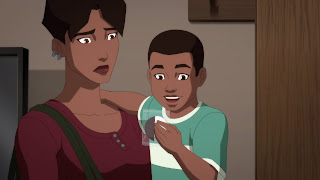
This trend continues with her diplomatic mission to New Genesis. While on the mission, she repeatedly butts heads with Orion, the biological son of Darkseid. His dark origins and violent outbursts shaped her opinion of him as a malicious tyrant. Because he failed to meet her initial expectations, she didn't seek to understand him or try to accommodate his needs. These choices made negotiations during the summit more difficult and caused conflict while fighting Lor-Zod's group.
Throughout the arc, Raquel begins to empathize more and more with Orion until she can "see" him. She realized that Orion's differences and his struggles with them did not make him a worse person. It made him a better person in his own unique way. She learned to apply this lesson to her relationship with her own son. Amistad's differences don't make him a failure. The concepts of perfection and normalcy only survive to cause division and less understanding between people.
By nature, superheroes hold a privileged position in society. They have exceptional abilities that they use to spread good and fight evil in the world. From an outside perspective, they're considered perfect people that everyone should strive to be exactly like. It can be easy for a hero to believe they should be the standard others should be judged by. If they can do it, why can't others? The reality is that the path to good and personal betterment is different for each person. Deviation and differences are not the signs of a person who's failed to reach perfection but just another aspect of the variety of humanity. While some heroes like Raquel may see themselves as examples of perfection, others believe it's their responsibility to always be the adult in the room.
Aquaman - Responsibility
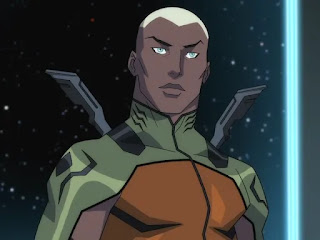
Aquaman, aka Kaldur'ahm, has held the burden of responsibility for almost his entire life. He's been forced into adulthood from a very young age. While growing up, he had to take care of his mother, who was suffering from depression, and at the same time work odd jobs to financially support his family since his father couldn't find work. On top of that, he also had to work on his education and his mandatory military service. All of this responsibility peaked when he became the first Aquaman's sidekick after helping him defeat Ocean Master. Even before the events of the series, Kaldur had endured far more hardship and burdens than most people twice his age.
Kaldur's complex relationship with adulthood reveals the core of his superhero mentality: responsibility. It's important to note that as he grew up, Kaldur never complained or resented the many responsibilities he shouldered. Even when asked to do things no child or teenager should do, he always accepted it humbly. This showcases Kaldur's mindset when it comes to superhero work. He is always willing to take any task presented to him, no matter how difficult or emotionally grueling, because he believes that he must. Instead, Kaldur would grit his teeth and endure the pain rather than have someone else suffer. Although it's a noble trait, this philosophy has almost destroyed him multiple times.
From the earliest formation of the Team, Kaldur has begrudgingly held the role of adult among his friends. He was the oldest and most mature member of the Team. Even before he was chosen as leader, a position he didn't ask for, it was often up to him to give direction to the Team. The role of leader was thrust upon Kaldur for the simple fact that no one else could perform the job. Although this decision led the Team to several major successes, it also required Kaldur to make major sacrifices in his own life.
Because being the leader of the Team demanded so much of Kaldur's time and attention, he was forced to essentially abandon his home in Atlantis and lose his opportunity for a relationship with Tula. As the leader, the Team's failures also fell on his head. The potential of a mole in the Team and Kaldur's decision to withhold that information from them almost fractured the group, which he took the blame for. The aftermath of the telepathic training simulation also greatly upset him. His inability to act as a general rather than a soldier forced him to confront his leadership flaws. Although he wanted to resign as leader, he was again forced to remain the adult in the room because no one else could fill the role.
Kaldur's biggest sacrifice to responsibility came when he had to go undercover to infiltrate the Light. Shortly after the death of his first love, Tula, and the revelation that Black Manta was his father, Kaldur began his undercover work. He was given almost zero time or opportunity to grieve this new information before being placed in extreme isolation, where he would have to fight his closest friends. It's honestly remarkable that Kaldur did not break under the extraordinary pressures he was under. Even though his mission was a success and provided the Team with vital information, it did come at a great cost.
His relationship with his closest friends and teammates was seriously damaged by the lies and deceptions he had to perform. Even years after the truth of his false defection came to light, friends like Superboy are still reluctant to trust him. Kaldur's mission also put his physical health at great risk. Not only did he risk torture and death from the Light if he was discovered, but his life was also in danger from his former teammates. After his fake murder of Artemis, many members of the Team were more than willing to come at Kaldur with close to lethal force. He was almost permanently left in a comatose state by Miss Martain when she got her hands on him.
That wasn't even the end of Kaldur's many challenges. Within a year of Wally's death, the mantle of Aquaman was passed onto Kaldur, and he was inducted into the Justice League. Not only was Kaldur now responsible for the title of Aquaman, but he was also a major member of the most important hero team in the world. He was also responsible for dealing with the Justice League's enemies, the Light. His choice to secretly create a new covert team and manipulate heroes like Black Lightning into joining further strained his fragile friendships.
Throughout it all, Kaldur never complained or shrugged off his duties. This naturally built up a lot of stress and unresolved trauma that wasn't truly addressed until his mini-arc in season 4. During that arc, we got to explore the fact that Kaldur has had one of the most challenging lives out of anyone in the series. He never takes time for himself and always takes on more than he can handle healthily. Luckily, the arc resolved with him learning to practice better self-care and accepting that not everything is his responsibility.
Kaldur's understanding of responsibility reflects an interesting aspect of superhero mentality and a commonly overlooked aspect of childhood for many POC people in real life. It's a regular theme in superhero media that heroes will often believe they can handle every problem and situation alone. Ultimately, it all becomes overwhelming, and not only does the superhero suffer because of it, but also the people they're trying to help. That exact situation happened to Kaldur several times throughout the series. I also believe that it's important that it's Kaldur that represents this theme. As one of the few black primary characters in the series, Kaldur perfectly represents the experience of many POC children. Because of the economic and societal difficulties that POC families have to endure, many children are forced to grow up faster than usual. They must care for younger siblings while their parents are away or working. They're forced to pick up jobs at an early age to help support the family. They're exposed to the dangers of a world that is actively hostile toward them at a young age while at the same time shielding those even younger than them from the worst harm. That experience encompasses Kaldur's entire life and time with the team. The challenges of adulthood have been his constant companion and greatest enemy that he's had to learn to take on healthily. While Kaldur faces off against the responsibilities of the world, another hero struggles with the burden of family.
Tigress - Guilt
Artemis is one of the few members of the Team who would understand Kaldur's experience of being forced to grow up fast. Artemis Crock is the second daughter of two notorious supervillains, Huntress and Sportsmaster. By the time she could walk and talk, Artemis was being trained to follow in her parents ' footsteps by Sportsmaster. This training often turned both verbally and physically abusive. So much so that Artemis's older sister Jade ran away from home and joined the League of Shadows. Although Artemis managed to avoid a life of crime and escape her father's abuse when her mother returned from prison, the sins of the Crock family would haunt her for the rest of her life.
Artemis's debut as a superhero is, from the start, burdened by her parent's history. When she joined the Team, it was under the condition that her family's identity remain a secret from the others. This precaution ultimately proved to be unnecessary as every member of the Team was more than willing to accept her despite her parents. This shows the intense level of shame and guilt that her family's history has on her. For the longest time, her greatest fear was that their past crimes or sins would somehow rub off on her or that she would be held responsible for them. This fear was so extreme that on multiple occasions, Artemis was willing to sabotage missions to keep that secret hidden.
This guilt and shame motivate many of Artemis's actions, especially regarding her family. Despite her disapproval of her family's past and current activities, she deeply cares for them all. More than anything, Artemis wants to make her family whole and will attempt to save them even when doing so puts her in difficult situations. During Artemis's mini-arc in season four, she tried multiple times to convince her sister, Cheshire, to turn away from a life of crime and reunite with her family. Although Cheshire always rejected the offer, even if she did accept, that would present a substantial risk to the family. Cheshire does have enemies who want her dead and would be more than willing to use her daughter and other family members against her. In addition to that, Cheshire is a notorious liar and could betray Artemis's trust at any moment. Even Cheshire's own mother didn't believe she could change for the better. Despite all that, Artemis still hasn't given up hope that she can one day fully restore her family. It's almost as if an obligation to family is forcing her hand even when it wouldn't benefit her.
That obligation takes on many forms, both big and small, from deciding to attend Gotham Academy to please her mother, returning to the Team to fake her death and help Kaldur infiltrate the Light, helping Will raise her sister's baby Lian, and essentially adopting the Halo, Brion, and Terra into her family. Like Kaldur, Artemis has had an almost never-ending set of obligations stacked on her. But unlike Kaldur, Artemis doesn't always accept these responsibilities graciously. She does it out of a sense of guilt and debt that she feels she owes to those around her. Her duties to herself, the Team, and her family often conflict and create strife within herself.
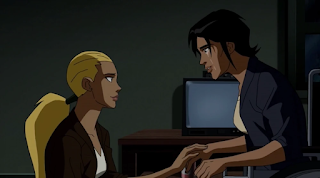
Artemis's sense of obligation also extends past her blood-related family members. Wally's death was a severely traumatic and challenging event that took years for her to move past. Just like with her family, Artemis grew to view her unresolved feelings about Wally as another obligation. An obligation to continue mourning him prevented her from moving on and finding new loves like potential Will or, ultimately, her current boyfriend Jason Bard. It wasn't until Artemis could express her grief and say goodbye, thanks to Miss Martian and Zatanna's fake limbo meetup, that she could move on and focus on her own wants and needs.
Artemis's storyline explores the way that heroes deal with guilt and obligations. They are willing to take on not just the obligations of their own volition but also the obligations thrust upon them. Heroes can feel like they have to do these things because they are part of a debt that they think is owed to those close to them. Operating as a superhero under that mentality can be just as destructive as any other superhero vice we've discussed. Guilt can build into feelings of resentment toward those you're trying to help and toward yourself because you don't believe you deserve to feel happiness or a sense of peace. Part of Artemi's growth as a character is realizing that she owes herself more than she owes others. Unfortunately, that feeling of being owed can fester into another nasty emotion: selfishness.
Zatanna - Selfishness
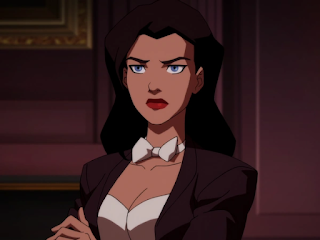
Unlike a lot of the other members of the Team, Zatanna Zatara's early childhood was not filled with any abnormal moments of difficulty. Two loving and attentive parents raised her, and she even got to explore the wonders of her magic abilities under the careful guidance of her father, Zatara. Besides her mother's death from cancer, Zatanna didn't have to experience any extreme hardships until after she joined the Team. Less than a month after being introduced to the Team, Zatanna lost her father after he made a deal to become the new Doctor Fate with Nabu in exchange for her freedom. Almost immediately and without warning, Zatanna had lost the life she had been accustomed to and was essentially orphaned. Despite her father being magically bound to the deal he made with Nadu, Zatanna never gave up hope of recovering Zatara. That goal would be the foundation of her challenges with a superhero mentality.
Like Raquel, Zatanna has a limited amount of screen time and focus compared to the other members of the Team, but the few moments she does have tell us a lot about her character. When it comes to her father, Zatanna is a fundamentally selfish person. I don't mean that in a necessarily bad way by any means. She has all the justification in the world to be selfish. She wants her father back for herself but is also naturally concerned for his well-being and health since he practically sacrificed his life to serve Nabu. Almost every person in the world would feel the same way she does. Despite that fact, the sheer amount of good that Nabu does for the world outweighs those feelings. Doctor Fate is a Lord of Order and is easily one of the most powerful members of the Justice League. Without his intervention, untold chaos and destruction would have befallen the planet on multiple occasions.
Regardless of the good he does as Doctor Fate, Zatanna tries repeatedly to separate her father from Nabu; some of those attempts are more questionable than others. Her first attempt was when she tried to remove the Helmet of Fate from her father but only got electrocuted for her efforts. Even when the entire Justice League was mind-controlled, Zatanna took the time to deviate from the mission to save her father.
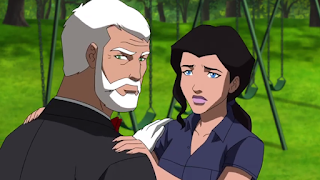
Over the years, Zatanna's persistence in freeing her father earned her a single hour of visitation each year. A bitter-sweet gift that only served to show Zatanna how old her father had grown and how little time she had to save him. These visits likely only motivated Zatanna further to find a way to separate her father from Nabu. These desperate and selfish feelings culminated in Zatanna's greatest morally questionable act in her mini-arc in season 4.
Over the years, Zatanna had taken on three younger proteges, Khalid, Thirteen, and Mary. Zatanna taught them how to harness and control their magical abilities for good, just like her father did for her. While training her students, Zatanna seemingly has the spontaneous idea that the proteges have progressed enough to become alternating hosts for Doctor Fate. At the end of the arc, Thirteen and Khalid had proven themselves capable to Nabu, while Mary's obsession with power disqualified her from the role. Before the two proteges accept a deal that will have them sacrifice a fourth of their lives, Khalid confronts Zatanna with a critical question. He asks her if Zatanna had purposefully taken on students with the express intention of grooming them to become hosts of Doctor Fate. Notablely, Zatanna refuses to answer this question. Instead, she only leaves the offer open for Thirteen and Khalid to decide.
Although the two students choose to become Fate's hosts of their own free will, it is still a terrifying thought that Zatanna might have been manipulating younger heroes who trusted her as their mentor. Is Zatanna selfish enough to sacrifice a significant portion of the lives of her proteges to save her father? Although we didn't receive a definitive answer, the result still ended with Zatanna getting precisely what she wanted. Her father is now partly freed from Nabu's control and can spend the remainder of his life with his daughter.
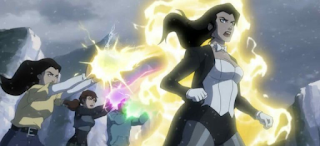
The moral ambiguity of Zatanna's actions is the foundation of her hero mentality. Superheroes fundamentally hold an immense amount of power and authority in society. They can do almost anything they want, and their popularity means they have a lot of influence over those around them. Even without the threat of violence, superheroes could convince most civilians to do whatever they desired. With that much power, the temptation to manipulate, extort, and exploit others is strong. That temptation is clearly present in Zatanna's character, and she likely struggled with that pull toward selfishness while training her students. A hero must resist the draw of selfishness; it is still up to be seen whether Zatanna has failed that challenge. The possibility of that failure opens the door for many exciting directions for her character if we're lucky enough to get a continuation of the series. While Zatanna battles with her wants and selfish desires, the alien demi-goddess of the team battles with power itself.
Miss Martian - Power
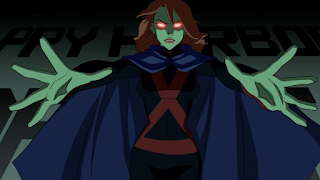
M'gann M'orzz grew up as an oppressed White Martian in a Green Martain-dominated society. M'gann grew up on a planet where she was essentially powerless, then ran away to a planet where she was one of the most powerful people around. After arriving on Earth and becoming the protege of her uncle, Martain Manhunter, M'gann was suddenly living the life of her dreams. She was a superhero and living out her teenage sitcom fantasy where she could perfectly blend into society. That fantasy did come with some road bumps, both big and small. As both a superhero and an alien on Earth, M'gann was operating on an almost entirely new system of ethics and morals that were foreign to her. These difficulties made up most of her growth as a character and helped develop her hero mentality.
M'gann's struggles with her powers started with her uncertainty about when to use her telepathic abilities. On Mars, telepathically projecting your thoughts into another's head and reading a person's surface thoughts are as normal as talking. But on Earth, they are an extreme invasion of privacy and a line that shouldn't be crossed. Except there are moments where it's okay to cross that line, like if the person gives permission or the target is a supervillain. The nuance of these interactions was something that M'gann needed help to navigate.
It wasn't only M'gann's telepathy powers that caused trouble too. When it came to her shapeshifting powers, the rules on Mars were once again different from those on Earth. Taking on another person's appearance and pretending to be them is treated as a fun game in Martain culture, but on this strange new planet M'gann finds herself on, it's another boundary that's inappropriate to cross. Shapeshifting is considered a deception that prevents people from seeing your "true" self. It's important to remember that when M'gann accidentally crosses these boundaries, it's not done out of malicious or selfishness. These abilities are a natural and innate part of her body. Not using them to their full extent would be equivalent to constantly walking on eggshells. A self-censorship of who she is.
Even when M'gann finally begins to get the hang of Earth's etiquette and culture, another challenge with her problems arises. During "Failsafe," M'gann accidentally traps the entire team in a psychic nightmare reality that leaves them in comas even after their simulated deaths. This episode revealed the truth that M'gann was one of the most powerful telepaths in existence, and even more terrifying, she wasn't in complete control of her powers. M'gann's abilities pose an even greater danger than violating a person's privacy or autonomy. M'gann could do serious psychic harm to those around her.
During the time skip between seasons 1 and 2, M'gann fully mastered her Martian abilities, but it also revealed a darker side of her personality. Using her superior telepathic powers, M'gann would destroy the minds of her enemies and rip vital information from their heads, leaving them in catatonic states. She even went so far as to try and alter Superboy's memories so that he wouldn't be angry with her anymore. Although these awful choices she made damaged the trust she built with Superboy, I still don't believe these actions were made out of malice. Although the attack on Kaldur was done for revenge because of Artemis's "murder," the other instances were done because they were easy.
While other heroes are tempted by power, M'gann is power. Nightwing goes so far as to call her "a ball of sunshine hiding a terrifying demi-goddess." That statement doesn't just refer to M'gann's powers but also her mentality. She thinks like a demi-goddess. Why interrogate a suspect when you can just steal the information? Why fight a villain when you can shatter their psyche with a thought? Why talk when you can read minds? Why work on repairing a damaged relationship when you can erase their memories of the event? All of these options are so much easier than the way they are supposed to be handled, and for M'gann, it is a million times more natural for her.

The battle between ease and ethics is the core of M'gann's character. It bears repeating that M'gann is power, and power makes things easier. That ease, though, can come at the cost of morality. I'm sure other superheroes often struggle with these choices as well. Life would be easier for heroes if they could use their powers to kill villains or cheat in their daily lives. The old Spider-Man adage still holds true. Power is a responsibility, and it is up to heroes to figure out how to use that power appropriately. M'gann's journey with power has been productive throughout the series. She's learned to hold herself to strict rules and regulations about what she can and can't do with her abilities. When dealing with a villain, she only uses the amount of power necessary to get the job done without causing permanent harm, as shown in her battle with her brother Ma'alefa'ak. Handling power is a dangerous balancing act, and M'gann must always be sure never to lose her footing. M'gann isn't the only stranger in a strange world on the Team. The other alien on the Team has his own battles with a superhero mentality to fight through.
Superboy - Insecurity
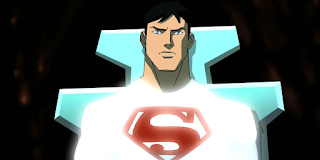
Superman holds the honor of being considered one of the greatest superheroes ever to exist, both within his universe and in the real world. Superman has always been held as the pentacle of justice and morality. No one is kinder, stronger, or morally righteous than the Man of Steel. Superman's status as a hero is something that villains, like the Light, have coveted and wanted to manipulate for their own ends for a long time. Their solution to this dilemma was Superboy. He is a genetic clone of Superman, designed to replace him if he dies or becomes a problem for the Light. Although Robin, Kid Flash, and Aqualad managed to rescue Superboy before being used as the Light's weapon, he was now in a world where Superman was alive and active. The Superboy, Conner Kent, was lost in the enormous shadow of Superman.
On a genetic level, Conner was born with the desire to become Superman. Despite this predisposed desire, he fails to reach Superman's level in multiple ways. Because of the human half of his DNA, Conner lacks the full Kryptonian powers of Superman. He can't fly or produce heat vision and isn't as strong as Superman. Conner lacks Superman's personality as well. Superman is known for his kindness, compassion, and patience, while Conner has extreme anger issues and a hot-headedness that causes him to be impatient.
Even though he is his genetic clone, Conner is everything that Superman isn't. This inadequacy created an intense feeling of insecurity in Conner. That insecurity was only made worse by the way other people treated him. Because Conner was created from Superman's stolen DNA and without his permission, he's viewed with a lot of mistrust by the Justice League, especially Superman himself. This, combined with the fact that Conner was a creation of their enemies, only amplifies those feelings. That means Conner is the one person on the planet that Superman doesn't treat with the same warmth and acceptance as everyone else. He is ignored and shunned by his genetic donor and idol. Not only is Conner physically incapable of being Superman, but he can't even learn how to make up for his flaws from the man himself.
All of this worsens his anger and insecurity. He becomes desperate. Desperate not only to become Superman but also to be accepted. To live up to the legacy of Superman, Conner would go so far as to accept shields from Lex Luthor to suppress his human DNA and live up to his full Kryptonian potential. Conner also took great pains to hide that Lex Luthor was the donor of his human DNA. He probably felt that having Luthor as a father only further highlighted the disparity between him and Superman. Conner's drive to be Superman was so great that when he believed his closest friends had been murdered and that the world was coming to an end during the telepathic training simulation, he could only think about his happiness over the fact that he finally understood what it's like to be Superman.
Although Conner eventually managed to win over Superman and begin building a brotherly relationship with him, that insecurity never truly left him. He was still keeping parts of his identity hidden from the public, preventing himself and the Genomorphs from living open and free. That issue was resolved when Superboy revealed his origins to the United Nations, incriminating Lex Luthor in illegal genetic experimentation and meta-human trafficking. Although all of Conner's secrets were now revealed to the world, his inner conflict with Superman was still buried deep inside him.
During season 4, while he was trapped in the Phantom Zone, Conner began to have hallucinations of seeing himself murder Superman and replace him. The extended period of isolation caused him to revert to his base programming of taking Superman's place. He imagined himself successfully living up to the title of Superman while simultaneously being a pawn of the Light and killing the Justice League. These hallucinations were so vivid that Conner actually believed that he had murdered his friends and family. All of Conner's greatest fears about himself had been confirmed. He was a monster willing to betray and kill those closest to him just to live out his Superman fantasy. This only served to do further damage to his mental state.
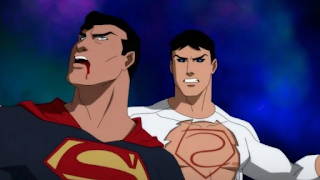
The Team eventually retrieved Conner from the Phantom Zone, and M'gann restored his scattered mind, but I believe that the foundational fear that Conner has is still with him. He'll likely always be terrified of what he may be willing to do to be accepted and live up to Superman's legacy. This issue of insecurity is the central theme of Conner's hero mentality. Heroes with mentors, like all of the core members of the Team, have massive shoes to fill when it comes to living up to their legacy. Their mentors are the greatest heroes on the planet and are considered the Earth's most powerful protectors. When it comes to Conner, the shoes he has to fill are the largest of all. I'm sure all the members of the Team are constantly wondering if they can fill the role and honor the symbols that they wear. For Conner, the S he wears on his chest carries the most baggage. He has to figure out if he's worthy enough to call himself Superboy and maybe eventually Superman. The last member of the Team that I'll be covering also has had his own struggles with legacy but almost in the exact opposite direction of Conner.
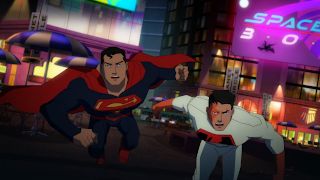
Nightwing - Legacy

Superman and Batman are after often treated as foils of one another. One represents light and hope, while the other represents darkness and vengeance. It's fitting then that their proteges would also be foils of each. While Connor wants nothing more than to become the new Superman, Dick Grayson has done almost everything in his power to avoid becoming the new Batman. That wasn't always the case, though. At the beginning of the series, Dick was just as eager as everyone else on the Team to one day fill in the roles of their mentors. He even mimicked Batman's lack of communication and expected to be picked as the de facto leader like Batman was for the Justice League.
From Dick's perspective, his entire life had been leading up to eventually becoming "The Batman." That all changed after the "Failsafe" episode. I bring up this episode a lot in this essay because "Failsafe" was the defining moment for many of the Team members. During the telepathic training mission, Dick finally got his opportunity to be the leader after Aqualad's "death." When push came to shove, Dick was forced to make the hard decisions and sacrifice himself and his friends to give the Earth even the slightest chance of victory.
The choices he made during the simulation traumatized Dick. He was very open about that fact during his therapy session with Black Canary. To Batman, the "mission" is the most important thing. Batman is willing to lie, manipulate, and sacrifice almost anyone to secure the mission. Dick came to the realization that he didn't have that same drive and no longer wanted to be Batman. We later learn that Batman never wanted Dick to become the new him. He specifically took Dick on as his sidekick so he wouldn't grow up to become like him.
At the start of season 2, it seemed that Dick had succeeded in his goal of not becoming Batman. He had created a new superhero identity for himself, Nightwing, and had retained his playful personality. He was even the new leader of the Team, having earned everyone's admiration and respect. Although everything seemed great on the surface, Dick was in turmoil underneath. He and Kaldur had fabricated a cover story for Kaldur to "betray" the Team and infiltrate the Light. When they needed more help, Dick managed to rope in Kid Flash and Artemis, who had both retired from the superhero life. He went so far as to fake Artemis's death to secure Kaldur's cover and add her to the infiltration team.
The deep cover mission almost destroyed the Team. It put the heroes and their family members through extreme trauma and mental anguish. They were also placed in severe danger because of the mission without their knowledge. Dick had lied, manipulated, and sacrificed those closest to him for the sake of the "mission," just like Batman would have. Despite his best efforts to separate himself from Batman, Dick was still slipping into his legacy.
At the end of season 2, Dick resigned as leader to grieve Wally's death. He operated as a solo hero for a while, but that didn't last long. To try and outmaneuver the Light, Dick, and several other heroes formed a secret group known as the Anti-Light. The Anti-Light required Dick to once again manipulate his friends and teammates for the good of the mission. Even when confronted with how damaging and dishonest his actions are, it seems that Dick can't help but fall back into the lessons he learned under Batman. Season 4 is really the only time we get to see Dick operate as a leader without the shadow of Batman directing him.
Dick represents such a unique aspect of the hero mentality. He reveals to the audience that legacies aren't always good. There's an extra layer of intrigue to it when you remember that the premise of this show is about how the next generation of heroes deals with the legacies of their mentors. The main question of the series is whether sidekicks can step outside the shadow of their mentors. Dick Grayson has always been the ultimate answer to this question. Both in the comics and the series, Dick is the only sidekick to truly form an independent identity separate from his mentor. Through Dick, we understand that the heroes and mentors you look up to can make mistakes and have flaws they struggle with. In no way are they perfect. Becoming your mentor isn't always the right decision. If you want to become a better hero than them, you'll have to unlearn a lot of their bad habits. Although Dick struggles with that task almost constantly throughout the series, it does seem like he's on the path to becoming not Batman but a better Nightwing.

As a series, Young Justice represents the complete mentality of being a hero, with each main character embodying a specific piece. Ego, perfection, responsibility, guilt, selfishness, power, insecurity, and legacy are what make up the mind of a hero. This is why Young Justice is the definite superhero show because the level of depth you get from the characters is like nothing else. If Warner Brothers is generous enough to let Greg Weisman and Brandon Vietti keep telling the story of Young Justice, I'm sure we'll dive deeper into the infinitely complex mentality of a hero.


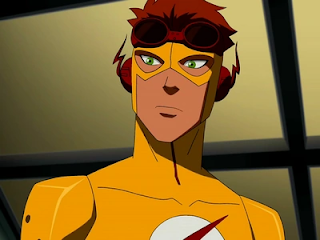
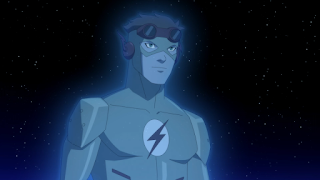
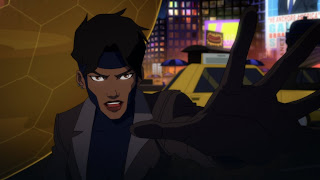
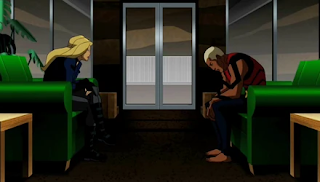
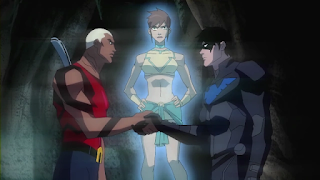
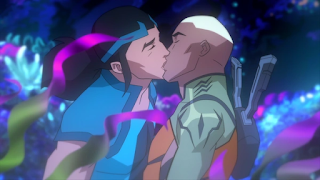
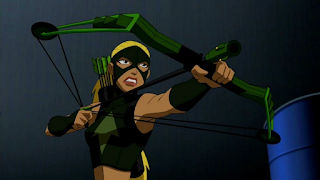

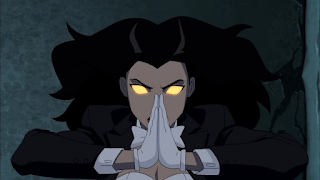

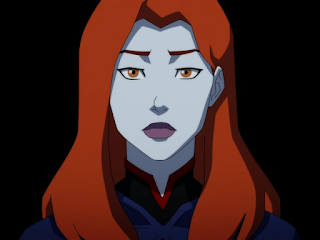
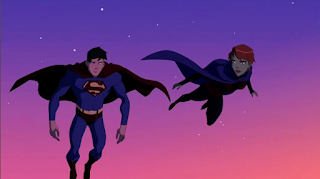


Comments
Post a Comment